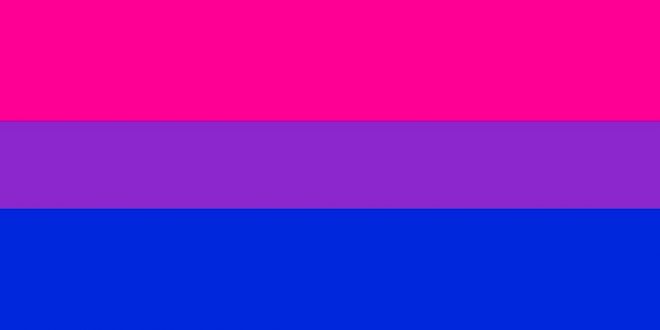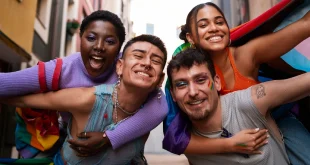Bisexuality has different meanings for different people. Bisexuality can be defined as the potential of a person to be attracted physically, emotionally and/or sexually to people regardless of their gender. In its simplest form, bisexuality is the attraction of a person to men and women. More complex forms may include attractions to transgendered people for example, a married woman makes love to her husband while he crossdresses as a woman or a lesbian is in a relationship with a male identified pre-operative female to male transsexual.
More women than you think harbor bisexual feelings, dreams and fantasies. Many keep them at that level. Others express them through close emotional but non-sexual friendships. Still other women rejoice in their bisexuality, whether out publicly or privately, in social or political settings, in their relationships or just through sex. Some women discover their bisexuality at an early age while others find it emerges over time as one becomes aware of and open to life’s possibilities. Some women, as do some men, try to ignore or suppress their feelings and deny whom they really are. They may choose to call themselves straight or lesbian to fit the expectations of others or their own need to belong. One should strive to be true to one’s self first through accepting one’s feelings and accepting others.This can lead to more open, honest, caring and fulfilling relationships and an inner peace and happiness.
Some people falsely believe that bisexuality is about swinging with other couples or singles of both genders. The truth is that bisexuality is about whom you are, not whom you are with. That aside, most bisexual people tend to be attracted to one gender more or less than the other. The degree of attraction towards one or the other can also change over time, even from week to week. Many bisexual people live their lives in monogamous relationships, committed to one partner but aware of their attractions towards other men and women. Others may have serial monogamous relationships or live in triads or group relationships or have a primary relationship and secondary partners. Many now turn to bisexual support and social groups for friendships.
Why not !!! Choosing a Bisexual identity to describe yourself is as valid as any other person who chooses a Gay, Lesbian, Queer or Straight identity. Whatever identity a person chooses, it should be their choice and not forced upon them by others, society or subjected to criticism, harassment or discrimination by others. Our sexual identity is only one of many identities we have: student, wife, mother, business woman, activist, poet, greenie, Aboriginal, Chinese, Australian, black, white, working class, feminist, lover, etc.
Some women choose bisexual labels that identify themselves further such as Straight-Identified Bisexual, or Lesbian-Identified Bisexual, Bisexual Queer, Bisexual Lesbian or Bisexual Dyke. Just “Bi” is often used. Being Bisexual is about being in touch with your feelings rather than whom you’re having sex with. It is about not limiting your options to one gender.
Your sexual identity can be a very private thing or a very public thing. It might be used in a very sexual way or a very political way. You may use it to describe the way you feel or the way you behave or the type of relationships you have. The way you express your bisexuality must ultimately be your choice for happiness.
“In dealing with such issues (husband’s bisexuality) I have examined my own sexuality. I have had to admit to myself that I too could be bi-sexual. I have acknowledged to myself that if I was looking for a partner again, I might not limit potential choices to just men. I have shared this with a few people close to me (including Peter). I have to thank Peter for providing a framework to explore this issue without a lot of negativity or guilt. I ponder why sexual orientation can change during a person’s lifetime. I have also begun to question how much of an individual’s sexual orientation is due to socialisation and how much much is biological. Perhaps a lot more people who regard themselves as gay/lesbian or heterosexual, are in fact bi-sexual.”
From “My Journey” by Octavia Filbert, 1995.
Women, HIV/AIDS and Sexual Health
Women are not immune to sexually transmitted diseases including the Human Immuno-deficiency Virus (HIV). World wide, it was estimated that the number of women with HIV and AIDS will surpass the number of men by the year 2000. In the USA, AIDS is the leading killer of young women while in Australia, the number of new HIV infections in women is slowly on the rise. The rate of HIV infection in parts of Central Europe, Africa, Central & South America, India and South East Asia is still increasing.
HIV is found in the vaginal secretions, in blood, semen (cum), in breast milk, in the secretions inside the arse (rectum) of infected people. Unprotected sex can transmit HIV and diseases such as gonorrhea, syphilis, herpes, genital warts and hepatitis B from an infected person to an uninfected woman or man. A woman can transmit these diseases to another woman through infected vaginal and anal secretions or blood via fingers, fists, sex toys or on the penis of a mutual male partner.
The use of disposable gloves and condoms can reduce the risk of infection. Use condoms and a water based lubricant when having intercourse with men. While the risk of HIV infection through oral sex is low, it has occured and other sexually transmitted diseases can be transmitted during oral-vaginal, oral-anal or oral-penile sex. The use of a barrier such as a dental dam or condom can be used. HIV and some other infections can be transmitted from mother to baby in the womb, during birth or may occur during breast feeding. The sharing of needles to inject drugs or medication can transmit HIV, Hepatitis B and C and syphilis so always use clean needles and syringes and never share them. Genital wart infections have been linked to cancer of the cervix and sexually active women should have regular pap smear screening and women over 40 should have regular breast and pap smear screening. Vaccinations for Hepatitis A and B are available from sexual health clinics or your doctor.
Be wise, be safe.
Presented by the Australian Bisexual Network – 2013
 Lesbian, Gay, Bisexual, Transgender & Intersex News Lesbian News, Gay News, Bisexual News, Transgender News, Intersex News, LGBTI News
Lesbian, Gay, Bisexual, Transgender & Intersex News Lesbian News, Gay News, Bisexual News, Transgender News, Intersex News, LGBTI News




